
No one says, “I want to watch more TV when I retire.” Something like 77% say they are going to travel more. Well, if AARP is right 42% do travel more, but 84% watch more TV. Guess which group I fall into? And TV was the genesis of this blog
“The Bite” is a 1 minute blurb that I see after some PBS cooking shows. It’s hosted by Mike Colameco’s “Real Food”. He looks and talks like a Jersey dockworker but is an American chef. One of these “Bite” episodes was on microplastics. He didn’t go all “climate change”, granola, or America hating. He just pointed out that microplastics are everywhere and in everything. Artic ice has it and so do Antarctic penguins. From people to fish to eggshells; you name it and it has microplastics.
Well, what does that mean? No one knows for sure. This is reminiscent of the talk of Strontium-90 in the early 70’s being everywhere, mercury levels in fish, and fluorocarbons depleting the ozone. The message is always the same: be afraid, be very afraid of anything that has the potential to impact this biological sphere. The One, true living God? It’s safe to live and die without giving Him a second thought. As Paul in Romans 3:18, quoting Psalm 36:1, concludes his “proof” of our fallenness, “There is no fear of God before their eyes.”
But what about those plastics? In a October/November 2024 Forbes, Steve Forbes has under the “Fact & Comment” section a brief article entitled “Plastic’s Image Needs Surgery” (21-22). He starts with the image above. “There are few more villainous products in the eyes of hardcore environmentalists than plastics.” The turtle trapped in a plastic six-pack holder seems to be the dominate image of today. In the 70s it was a fish trapped there or more often in pull-tab (look it up Gen-Xers and younger) from a beer can.
As bad as plastics are for the environment, they are better than aluminum and glass. Forbes quotes this headline from Reason, “’Plastics Are Better for the Climate Than Aluminum and Glass, Actually.’” The peer-reviewed journal Environmental Science & Technology found that “’replacing plastics with alternatives [such as glass and aluminum] is worse for greenhouse gas emissions in most cases.’” “Producing paper bags discharges up to five times more greenhouse gases than producing plastic versions.” Aluminum cans and glass bottles versus plastic? “Not even close!”
Forbes goes on to says, “The two-to-one margin for emission ‘badness’ holds when comparing wooden dinning sets with plastic ones.” Finally, “The alleged environmental advantages of so-called renewables, for example, disappear when assessing them from start to finish. Add in the exorbitant expenditures, the unreliability of weather …and the case for the big energy alternatives – solar panels and windmills – disappears like water in a scorching desert.”
Two things: One, most who would be looking for this blog already knows what Forbes says. Two, it does no good to cite such facts with the woke, sky-is-falling environmentalists, or tree-huggers. That’s because this is a matter of faith for them, a religion. If they can’t save this planet, then nothing can be saved including themselves. A doable law is very much part of this movement. Doing one thing for the environment, for climate change, or for Mama Nature, and you’re going to live forever.
I recently read In the Hurricane’s Eye, a 2018 account of Washington’s victory at Yorktown. This is without a doubt the best history of the Revolutionary War I’ve ever read. I had no idea how huge the French navy was in America’s victory.
Two facts from this book bear on this blog. The most destructive Caribbean hurricanes, three of them, happened in October 1780 killing upwards of 20,000. Second, to make a single French 74-gunship took about 52 acres of trees totaling 2,000 mature oaks.
The facts I bring in evidence are time and resources. Reliable weather reports are at the most 130 years old. We know of little ice ages; we know how dramatically one volcanic eruption can affect the climate; we know climate changes but we can make very little predictions where it is going because we don’t know a whole lot, reliably, of where it has been. Also, there is no way to live on earth without impacting climate. Had the world not switched from wood to coal, there could have been no industrial revolution. Just how many places in there world are there 2,000 mature oak trees growing at one time.
Check out for yourself what I, or rather Forbes, is saying, but don’t use AI. AI searches use 10 times the electricity that a conventional Google search does. And remember, Google searches haven’t yet existed for 30 years.
